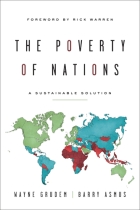 Wayne Grudem and Barry Asmus, The Poverty of Nations: A Sustainable Solution (Wheaton, IL: Crossway, 2013). Paperback / Kindle
Wayne Grudem and Barry Asmus, The Poverty of Nations: A Sustainable Solution (Wheaton, IL: Crossway, 2013). Paperback / Kindle
The Poverty of Nations is an ambitious book. The goal of authors Wayne Grudem (a theologian) and Barry Asmus (an economist) is to provide “a sustainable solution to poverty in the poor nations of the world, a solution based on both economic history and the teachings of the Bible.” Toward that it end, their book focuses on what nations should do if they want to move from poverty to prosperity.
What does it mean for a nation to move from poverty to prosperity? According to Grudem and Asmus, it means that “a nation continually produces more goods and services per person per year.” A nation that does this will see rising income per capita as well as a growing gross domestic product.
Throughout history, nations have adopted various economic systems to attain this goal. In modern times, the three most common systems have been capitalism, socialism, and the welfare state. Grudem and Asmus contend that the best economic systemic for producing more goods and services per person per year is capitalism, or in their preferred term, “the free market,” which rests on a four-cornered foundation of private property, the rule of law, a stable currency, and relatively low tax rates.
How does the free market work? Grudem and Asmus outline six factors: “(1) decentralized decision making (‘no one’ decides), (2) specialization and trade, (3) the signaling system of the market, (4) prices as the language of the signaling system, (5) profits and losses as the green lights and red lights of the system… [and] (6) competition and voluntary cooperation.”
The free market system does not work without the crucial contributions of politics and culture, however. It requires an effective, but limited government—one that protects citizens against force and fraud; promotes education, stable family structures, and freedom broadly construed; and finally protects against bureaucratic corruption by enforcing the rule of law.
Additionally, the free market system requires that citizens embody certain values, beliefs, and practices—in Tocqueville’s famous phrase, “habits of the heart.” A nation does not just consist of economic and political systems, in other words. It consist of persons who act and interact according to a certain kind of cultural norms. If those persons do not value material wealth or manual labor or keeping promises, for example, and if those values become so widespread that they harden into a national culture, the free market system simply will not work in that nation.
Having summarized the argument of The Poverty of Nations, let me offer several comments on its argument.
First, on the whole, I agree with Grudem and Asmus’s assessment. Nations that have risen from poverty to prosperity have adopted some version of the free market system. This means that socialism is not a viable economic—or political—system if a nation wants to become prosperous. On the other hand, a free market system can accommodate welfare-state functions to some degree. So, while socialism and the free market are antithetical, the welfare state exists in a much more complicated relationship to a market economy than the authors let on.
Second, the authors have done an excellent job of explaining how markets work and why the free market system requires a certain kind of politics and culture. They also ably distinguish and defend the free market system from its simulacra—what William J. Baumol, Robert E. Litan, and William J. Schramm call “bad capitalism,” that is, “crony capitalism” and “oligarchic capitalism.” When people critique the free market system, they often point to nations whose political economies actually are better characterized using one of those terms.
Third, I appreciate the authors’ use of the phrase “consistent with” when talking about the relationship between the political-economic-cultural requirements of the free market system and the teachings of the Bible. It would be anachronistic to say that the Bible teaches the free market system (or socialism, for that matter). A Christian simply cannot derive a complete economic system from the Bible. However, biblical principles can guide how a Christian evaluates a given economic system. Grudem and Asmus note repeatedly that this or that aspect of capitalism is “consistent with” biblical teaching, without falling into the error of saying that the Bible requires capitalism. This is an important hermeneutical point.
Fourth, the authors note at the beginning and end of the book that material prosperity is secondary to spiritual wellbeing: “a person’s relationship to God is far more important than material prosperity, and…the pursuit of material wealth can, in fact, very easily take first place in one’s life rather than a relationship with God.” Amen to that!
Finally, no book—not even one approaching 400 pages in length as this one does—can explore every avenue of inquiry about a topic. Some critical readers will want to press the authors more on the issues of inequality and environmentalism, which often come up in critiques of the free market system. I personally would like to have seen a discussion of what Robert M. Nisbet called “the cultural contradictions of capitalism.”
Regardless, The Poverty of Nations is a real achievement, which I highly encourage those Christians who would help the poor to read. We should be generous to the poor as individuals and as churches, but we should also realize a long-term solution to national poverty requires solutions at a more systemic level. Wayne Grudem and Barry Asmus have made a persuasive case for the free market as that necessary system.
P.S. If you found my review helpful, please vote “Yes” on my Amazon.com review page.
Leave a reply to Steve swartz Cancel reply